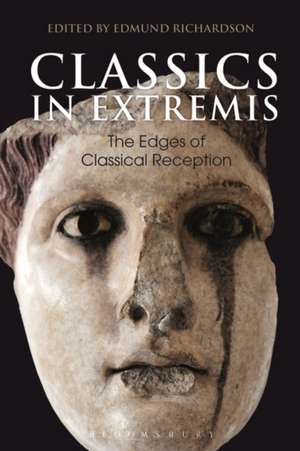Classics in Extremis: The Edges of Classical Reception: Bloomsbury Studies in Classical Reception
Editat de Dr Edmund Richardsonen Limba Engleză Paperback – 27 mai 2020
| Toate formatele și edițiile | Preț | Express |
|---|---|---|
| Paperback (1) | 224.94 lei 6-8 săpt. | |
| Bloomsbury Publishing – 27 mai 2020 | 224.94 lei 6-8 săpt. | |
| Hardback (1) | 715.73 lei 6-8 săpt. | |
| Bloomsbury Publishing – 31 oct 2018 | 715.73 lei 6-8 săpt. |
Din seria Bloomsbury Studies in Classical Reception
-
 Preț: 90.70 lei
Preț: 90.70 lei - 14%
 Preț: 180.44 lei
Preț: 180.44 lei - 30%
 Preț: 598.52 lei
Preț: 598.52 lei - 11%
 Preț: 218.91 lei
Preț: 218.91 lei -
 Preț: 90.37 lei
Preț: 90.37 lei - 22%
 Preț: 225.77 lei
Preț: 225.77 lei - 11%
 Preț: 220.75 lei
Preț: 220.75 lei - 30%
 Preț: 540.31 lei
Preț: 540.31 lei - 22%
 Preț: 237.75 lei
Preț: 237.75 lei - 30%
 Preț: 597.63 lei
Preț: 597.63 lei - 22%
 Preț: 224.03 lei
Preț: 224.03 lei - 21%
 Preț: 218.74 lei
Preț: 218.74 lei - 21%
 Preț: 218.65 lei
Preț: 218.65 lei - 22%
 Preț: 225.96 lei
Preț: 225.96 lei - 21%
 Preț: 218.47 lei
Preț: 218.47 lei - 30%
 Preț: 569.76 lei
Preț: 569.76 lei - 21%
 Preț: 217.62 lei
Preț: 217.62 lei - 23%
 Preț: 185.19 lei
Preț: 185.19 lei - 20%
 Preț: 219.57 lei
Preț: 219.57 lei - 30%
 Preț: 541.85 lei
Preț: 541.85 lei - 18%
 Preț: 166.36 lei
Preț: 166.36 lei - 30%
 Preț: 569.60 lei
Preț: 569.60 lei - 23%
 Preț: 254.55 lei
Preț: 254.55 lei - 30%
 Preț: 599.41 lei
Preț: 599.41 lei - 22%
 Preț: 261.08 lei
Preț: 261.08 lei - 22%
 Preț: 260.16 lei
Preț: 260.16 lei - 30%
 Preț: 598.02 lei
Preț: 598.02 lei - 30%
 Preț: 569.70 lei
Preț: 569.70 lei - 21%
 Preț: 218.65 lei
Preț: 218.65 lei - 30%
 Preț: 568.22 lei
Preț: 568.22 lei - 22%
 Preț: 772.98 lei
Preț: 772.98 lei
Preț: 224.94 lei
Preț vechi: 288.98 lei
-22% Nou
Puncte Express: 337
Preț estimativ în valută:
43.04€ • 45.10$ • 35.58£
43.04€ • 45.10$ • 35.58£
Carte tipărită la comandă
Livrare economică 11-25 aprilie
Preluare comenzi: 021 569.72.76
Specificații
ISBN-13: 9781350166264
ISBN-10: 135016626X
Pagini: 272
Ilustrații: 31 bw illus
Dimensiuni: 156 x 234 mm
Greutate: 0.38 kg
Editura: Bloomsbury Publishing
Colecția Bloomsbury Academic
Seria Bloomsbury Studies in Classical Reception
Locul publicării:London, United Kingdom
ISBN-10: 135016626X
Pagini: 272
Ilustrații: 31 bw illus
Dimensiuni: 156 x 234 mm
Greutate: 0.38 kg
Editura: Bloomsbury Publishing
Colecția Bloomsbury Academic
Seria Bloomsbury Studies in Classical Reception
Locul publicării:London, United Kingdom
Caracteristici
Features contributions from some of the leading voices in the field, such as Lorna Hardwick, Edith Hall and Jennifer Wallace
Notă biografică
Edmund Richardson is Associate Professor of Classics at Durham University, UK. He has published Classical Victorians: Scholars, Scoundrels and Generals in Pursuit of Antiquity (2013), and was named one of the BBC/AHRC New Generation Thinkers in 2016.
Cuprins
1. Introduction - Edmund Richardson - Durham University, UK 2. Thinking with classical reception: critical distance, critical licence, critical amnesia? - Lorna Hardwick - Open University, UK3. Daphnis transformed: Aphra Behn's politics of translation. - Amanda Klause - Academy of Notre Dame de Namur, USA4. Local engagements with Ancient Greek vases in Ottoman and Revolutionary Greece, c.1800-1833. - Alexia Petsalis-Diomidis - University of St Andrews, UK5. The hand that shook the world: Daniel Dunglas Home's disembodied classics. - Edmund Richardson - Durham University, UK6. Picturing Antiquity: photography, performance and Julia Margaret Cameron. - Jennifer Wallace - Cambridge University, UK7. High culture in low company? The reception of ancient 'homosexuality' in the pornographic The Sins of the Cities of the Plain: The Recollections of a Mary-Ann. - Jennifer Ingleheart - Durham University, UK8. The Caribbean Socrates: Pedro Henríquez Ureña and the Mexican Ateneo de la Juventud. - Rosa Andújar - King's College, London, UK9. Beyond the limits of art and war trauma: David Jones 'In Parenthesis'. - Edith Hall - King's College, London, UK10. Classics down the mineshaft: a buried history. - Henry Stead - Open University, UK11. Extreme Classicisms: Jorge Luis Borges. - Laura Jansen - University of Bristol, UK12. The costly fabric of conservatism: Classical references in contemporary public culture. - Maarten De Pourcq - Radboud University Nijmegen, NetherlandsBibliographyIndex
Recenzii
This is a thought-provoking, engaging volume. Its scope ensures that it will appeal to a wide range of audiences, while pushing us to think further not only about the reception of classics in contexts that have often been seen as 'marginal', 'peripheral', or in extremis, but also to see how these 'edges' have been altered and re-shaped by those engaging with Graeco-Roman antiquity.
[The contributors] have enlivened "marginal" voices upon whose winged-words were the Greeks and Romans. The range of these voices is proof that "Classics" has never truly been the exclusive realm of the elite male, despite attempts by the latter to make it so . Classics in Extremis is an excellent and timely addition to the contemporary scholarly zeitgeist.
[The contributors] have enlivened "marginal" voices upon whose winged-words were the Greeks and Romans. The range of these voices is proof that "Classics" has never truly been the exclusive realm of the elite male, despite attempts by the latter to make it so . Classics in Extremis is an excellent and timely addition to the contemporary scholarly zeitgeist.
